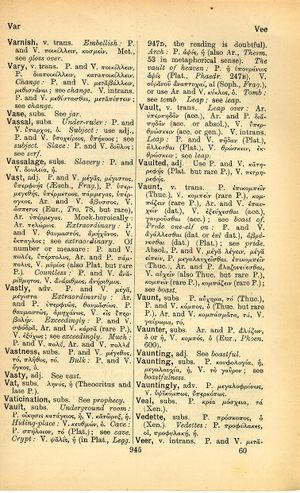vast: Difference between revisions
From LSJ
οὗτος μὲν ὁ πιθανώτερος τῶν λόγων εἴρηται, δεῖ δὲ καὶ τὸν ἧσσον πιθανόν, ἐπεί γε δὴ λέγεται, ῥηθῆναι → this is the most credible of the stories told; but I must relate the less credible tale also, since they tell it
m (Text replacement - "<b class="b2">Frag.</b>" to "''Frag.''") |
(nlel) |
||
| Line 11: | Line 11: | ||
<b class="b2">Countless</b>: P. and V. [[ἀναρίθμητος]], V. [[ἀνάριθμος]], [[ἀνήριθμος]]. | <b class="b2">Countless</b>: P. and V. [[ἀναρίθμητος]], V. [[ἀνάριθμος]], [[ἀνήριθμος]]. | ||
}} | |||
{{nlel | |||
|nleltext=[[βέβαιος]], [[πηγός]], [[στερέμνιος]], [[στερεός]], [[στερεωπός]], [[στέριφος]] | |||
}} | }} | ||
Revision as of 18:10, 9 January 2019
English > Greek (Woodhouse)
adj.
P. and V. μέγας, μέγιστος, ὑπερφυής (Aesch., Frag.), P. ὑπερμεγεθής, ὑπέρμετρος, πάμμεγας, ὑπέρογκος, Ar. and V. ἄβυσσος, V. ἄσπετος (Eur., Tro. 78, but rare), Ar. ὑπέρμεγας.
Mock-heroically: Ar. πελώριος.
Extraordinary: P. and V. θαυμαστός, ἀμήχανος, V. ἔκπαγλος; see extraordinary.
Of number or measure: P. and V. πολύς, ὑπέρπολυς, Ar. and P. πάμπολυς, V. μυρίος (also Plat. but rare P.).
Countless: P. and V. ἀναρίθμητος, V. ἀνάριθμος, ἀνήριθμος.

